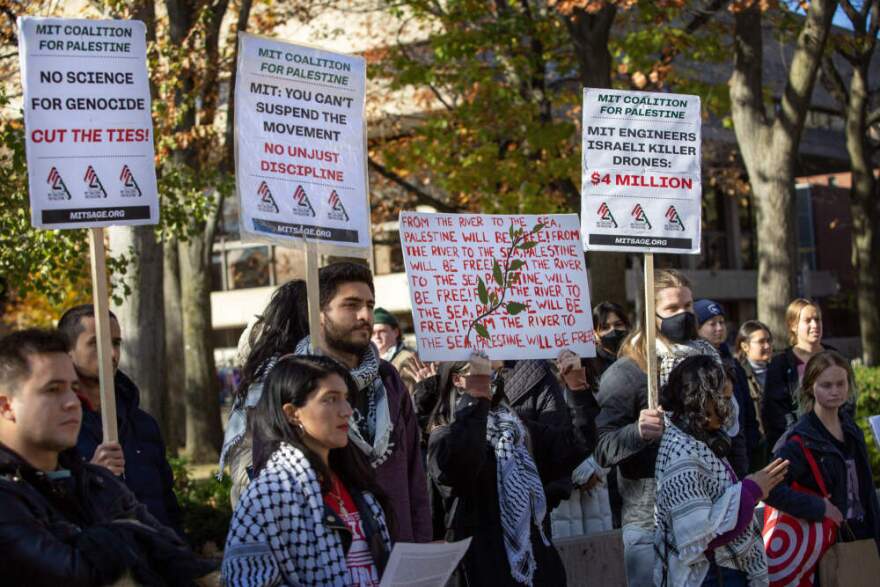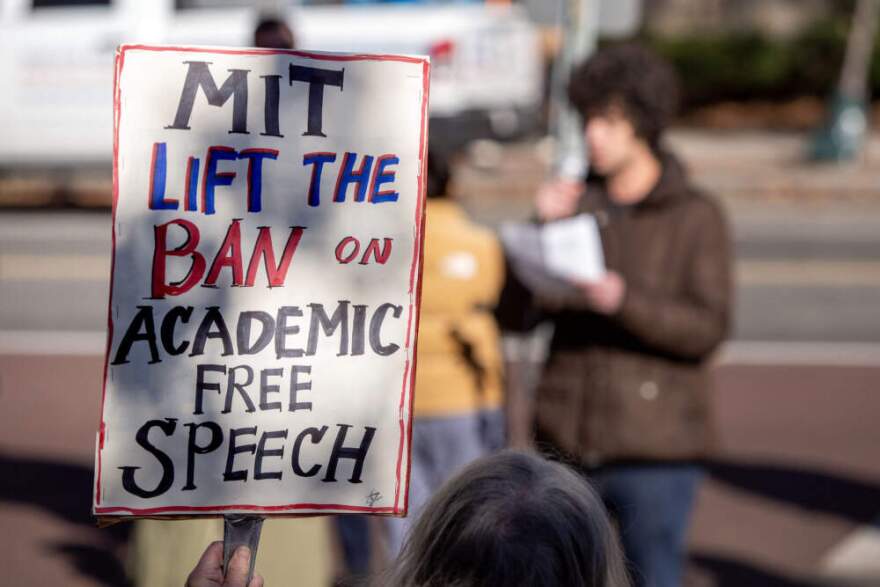Nearly 100 MIT students rallied on the Cambridge campus Thursday following a university decision to ban the distribution of a pro-Palestinian student-run magazine and discipline one of its editors.
The latest issue of the publication, Written Revolution, included the article “On Pacifism,” which featured imagery and language that “could be interpreted as a call for more violent or destructive forms of protest at MIT,” according to an email sent by MIT Dean of Student Life David Warren Randall to the editors of the magazine.
The crowd held signs demanding MIT end the “ban on free speech” and “cut the ties” with Israel. Copies of the prohibited volume were distributed to students, faculty and staff in attendance.
“We will not rest until MIT reverses its undemocratic sanctions against Written Revolution and its editors and ends its ties to the [Israeli Defense Services’] ongoing genocide,” Sophie Green, an editor of Written Revolution, told the crowd.
The MIT Coalition for Palestine organized the rally, whose speakers included editors of the magazine and members of the Black Student Union and Jews for Collective Liberation.

Founded during last spring’s protest on MIT, Written Revolution is a multidisciplinary student zine featuring poetry, essays and art about the pro-Palestinian movement.
In addition to concerns about violent language, Randall’s email also cited the inclusion of several images in the article, including one that incorporates the logo of the Popular Front for the Liberation of Palestine, which has been designated by the U.S. State Department as a terrorist organization.
The decision to prohibit the issue was made after consulting with the faculty co-chairs of the Ad Hoc Committee on Academic Freedom and Campus Expression and other MIT leadership, according to the email.
An MIT spokesperson said the university is unable to discuss individual students, but university leadership is committed to protecting free speech and responding to policy violations.
Editors of the magazine take issue with the disciplinary action.
“We want to say this is a gross violation of free speech,” said Prahlad Iyengar, the author of the article and an editor of the magazine.
Iyengar said the purpose of the magazine was to “put out, in our own words, what we were doing, why we were doing it and what was happening on campus.”
Following publication of the October issue, Iyengar said MIT barred him from entering campus. In an email to Iyengar reviewed by WBUR, the Office of Student Conduct and Community Standards cited “a series of continuing behaviors” that included his essay, a protest held outside a campus lab and an email sent to grad students and postdoctoral researchers who work in the lab.
Iyengar, a PhD student in the Department of Electrical Engineering and Computer Science, said the campus ban poses a threat to completing his degree. Iyengar said he was also suspended last year following the pro-Palestinean rallies.
Last spring, MIT’s campus protests culminated in a 20-day pro-Palestinian encampment. The administration responded with repeated warnings to disperse, a police raid on the encampment and student suspensions and arrests.
This article was originally published on WBUR.org.
Copyright 2024 WBUR

